Monica Packer worked hard at everything she did until perfection became an obsession. She hit rock bottom during college and again after she was married. She started an experiment to see what she could learn without making her goals a mandatory checklist and has embraced “progress over perfection.”
Advisory: eating disorders, suicidal ideation
Could you tell us about yourself growing up and how perfectionism became unhealthy?
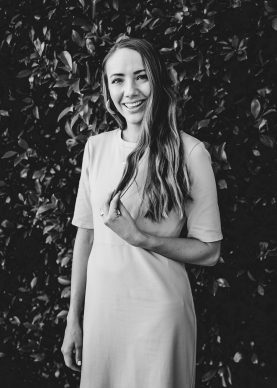
Monica Packer
I’ve always loved learning and personal development, but a lot of us also know what it’s like when that goes too far. I became a stereotypical perfectionist around seventh grade, recognizing that good grades are a good thing. I overheard kids say what grade they got and other kids praising them, and thought, “That matters. That’s a sign of being a good person.”
Perfectionism shifted as a teen to focus on appearance. Nobody pressured me or told me I had to hit a certain metric. I took all the little seeds of what I thought it meant to be a good person and turned them into a full garden of perfectionism. It was all with good intentions – I was just trying to be a good person, but it was taken to extremes. During high school, I hit all the achievements: spiritual, the physical body, school, extracurricular, leadership, everything.
But when I started BYU, I went from being a high school stand-out to being a nobody on a huge university campus. I tried out for a few things I used to excel in but wasn’t accepted at the BYU-level. Before, the only way I knew how to measure myself was outcomes through playing the flute or dancing or acting or leadership, so I didn’t know who I was without those things. In college, my praiseworthy outcomes came through academics. I was almost a 4.0 student the entire time at BYU.
The BYU time was also when years of disordered eating turned into full-blown eating disorders. To have my appearance prove my worth in my teens – again, with good intentions – I was very “disciplined” in what I ate, but I see now I was largely living a life of restriction and disordered eating. I hit rock bottom after studying abroad in London. I was the first of my family to leave the United States besides serving a mission, and I saw things my dad had been reading about his entire life and would have loved – history, art, music, dance. But the entire time, I was obsessing over what I could or couldn’t eat that day, or how much exercise I should do. Food went from something I could control to something that controlled me. It was there I had my first experiences with binging. In my mind, this was the “wrong” kind of eating disorder. I had anorexia off and on for years but they’d never get binging. I felt so much shame and despair.
My life felt out of control so I went to get help. I was a peer mentor for Freshman Academy and had been to the counseling office with other students to help support them, so I knew that they typically took the intake form and said they would call to schedule an appointment. But with me, it was different. I handed the intake form over the desk and she asked me to take a seat while she reviewed it. Then she said, “Please come right in.”
I’m glad she recognized an extreme need and started working with you immediately.
Me, too. It got worse before it got better, in scary ways. I was doing all the things, but my shame became so all-encompassing that I almost took my own life. There are some streets near the campus with curves where drivers can’t see pedestrians, and I could just walk in front of a car. I stood there several times, trying to get the courage to do it. Thankfully, I didn’t.
I did have a good therapist at BYU. One of the most profound things was he confirmed that yes, I had an eating disorder. Part of me didn’t believe it and thought it was a lack of self-control. The other thing he told me was I couldn’t fix it overnight. This honestly was a relief to hear. It did take several years before I saw real progress.
In my pursuit of recovery, I went down another path. Before, I was hellbent on proving myself with outcomes I could create. Now, I was too scared to try anything. I worked really hard on recovery from the eating disorder, but everywhere else in my life, it was just about duty. I got married at age 21, and I could show up for my husband. We moved to Alameda, California (near Oakland), and I was a middle school teacher – I showed up for my work really well. I showed up for my church callings. But everything was about fulfilling responsibilities – for myself, there were no goals or personal ambitions.
I became what I now know is the most common perfectionist: the underachieving perfectionist. The route is the same as the overachieving perfectionist: fear of failure, fear of not measuring up, because your worth and identity are tied to an outcome. Overachieving, you’re always on a hamster wheel, trying to achieve, achieve, achieve and you never get there. Underachieving, you stay stuck on the sidelines of your own life because you don’t believe you’re going to get anywhere, so why try.
I also was terrified to be developing a faith crisis tied to my womanhood. I had kids and stopped working full-time outside the home – I was a stay-at-home parent. Again, I was showing up for my responsibilities with my kids, for my husband, for my church calling. But I was stuck in the same place – I felt despair, lost, depressed, resentful.
That’s something I noticed – you were still meeting life milestones like getting married, having a job, having kids. Did people not recognize that you were experiencing difficulties?
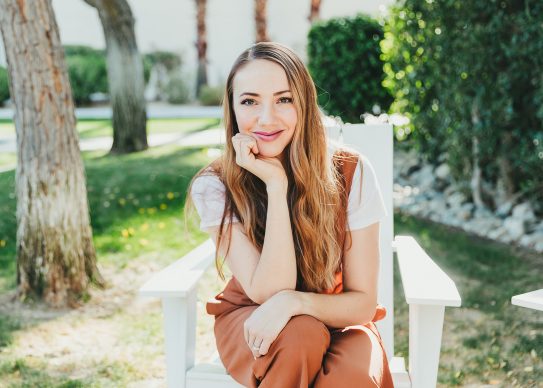
Monica Packer
Perfectionism is a shield. And I held up that shield like it was my job – no one was allowed to see how bad it really was. My husband wanted to date me for a long time, but it was in the beginning of my recovery from the eating disorders, and I couldn’t. I was honest – I told him, “It’s not you,” and alluded to working through some things. I thought he could read between the lines. More than a year into being married, his sister saw something I wrote on a blog and asked him, “Did Monica used to have an eating disorder?” He responded no, and I realized I had never directly told him that.
I never told a roommate. I never told a friend. I never told a parent. Only my therapist at BYU knew. It was the same problem later with the beginning of my faith crisis – I didn’t let people in. I was so terrified of being an apostate that I would not open my mouth and tell even my husband how bad it really was. That really impacted the beginning of our marriage. I presented a picture of, “This is who you are married to,” and held him at arm’s length. I did not want him to know the weak parts, the scary parts, the messy parts.
You said your faith crisis was related to your womanhood. I can take a wild guess what that meant.
Yep, motherhood was a big part! In my family, all the women had a baby within a year of getting married. When I got married, I felt sudden, looming pressure, “This is what’s next for you.” I knew I wanted children but I also knew it was not the right time yet. Having a baby right away was one of the ways to be a good woman. You don’t have to directly hear it to know you need to follow the script.
I have five kids now, and I truly love being a mom. But then, I felt like my whole life would be changing diapers and washing dishes, and I felt despair whenever I thought about it. Then I felt ashamed about my despair. I wanted to get a Ph.D. in humanities and become a college professor, but I could not see a way to blend these two really important parts of myself.
The biggest problem was I felt like I was a second-class citizen to God. He’s given me intellect and talent and ambition and passion. But I thought that if I were to use those gifts, I would be going against what God wants with having children. When I shared my concerns with a few people, they said positive things and tried to help me walk through it. But when I asked deeper questions about how it connected to my status as a woman in the Church there was a lot of fear that I was a feminist. I remember saying, “Don’t worry, I’m not a feminist.”
Still, I loved reading female writers in the Church and during that phase of my life, blogs were popular. There was a publicized push for women to wear pants to church, and I was shocked that I innately saw their perspective and agreed with those women. I was also shocked to see the hate they received. Literal death threats! I found myself kneeling by the couch during my daughter’s naptime, sobbing and praying, “Please let me not be an apostate.”
I think a lot of women can relate to the shock of realizing, “I am a feminist, and this competes against what I’m being told is right, what I think I’m supposed to do and be and believe.” I understand now that being a feminist does not compete with the gospel. I am a feminist because of what I believe about God and our faith, but it took a long time to get there.
There are a lot of ways to interpret the phrase, “second-class citizen.” What did that mean to you?
So many of my struggles with that have been internal, but they were not created internally. It was about reading the room in church settings and internalizing others’ expectations of women, of myself.
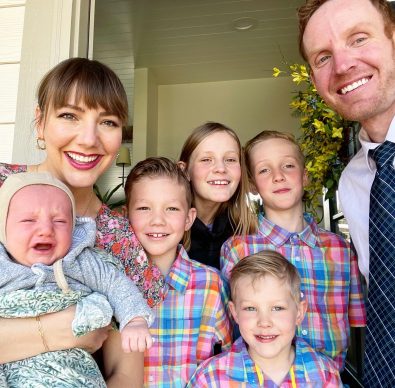
Monica Packer and her family
My husband is really awesome – he’s never been a person who comes home and says, “Where’s my dinner? What did you do all day?” But in other settings, it was so clear to me that to pursue my passions, talents, and gifts would completely contradict my role as a woman, which is to be a mother and a stay-at-home mom. It was expected and modeled for me. I couldn’t see that pursuing my talents and being a mother could complement each other. I knew God had blessed me with these talents and gifts, and I knew I wanted to be a mother. Seeing them as a contradiction was a conflict for a very long time.
The other big struggle with womanhood was Heavenly Mother – my entire life, I wanted to connect with Her and know more about Her. Also, a big part of the despair was what Heavenly Mother represents for my future and my role as a woman being only motherhood. It hit me harder than it ever had before – that I was nothing, and essentially my job was to wash dishes and change diapers forever and ever. At that time, I knew that it wasn’t okay to even speak of Heavenly Mother so I wondered, am I destined for an eternity of being anonymous to my spiritual children? I thought that the answer was, “Yes, because this is your supportive role. This is where you’re supposed to find joy.” That was terrifying and heartbreaking to me because if that’s the case, that also represents my literal life now, how it plays out if I’m only supposed to be the silent creator.
That was hard because I had to ask – do I mean anything to God? I was struggling to receive answers to prayer, no matter what I did. This lack of answers felt personal, like it was about my gender, about me directly. I concluded that if God’s a man and I’m a woman, that must be why He would not take time to answer my prayers – because I’m not worth it.
That’s a heavy spiritual burden. How did things begin to shift for you?
Honestly, it took years. I had to start logically. I gradually came to terms that yes, I am a feminist, because it makes sense to me that I am just as important to God as His male children. It makes sense to me that Heavenly Mother exists, and She’s not on the sidelines for all eternity, just having billions of eternal children and that’s Her only job. Who knows how that works, but that was a real fear for me.
I made shifts externally by being more honest about my struggles and my thoughts. I began to do this after we moved from Alameda to Walnut Creek. Our first Sunday in our new ward was a “wear pants to church” day. I was too much of a rule follower to wear them then, but I did put my 15-month-old daughter in pants. That was my first little move. In that ward, I was met with total love, understanding, and nuance. I needed all three of those things.
One of the first times I spoke up in Relief Society was about the nature of God – “I feel like I know the nature of God better when I think of Heavenly Mother’s hand where there’s beauty, there’s healing, there’s creativity.” As I shared that, a woman turned around and looked at me. I thought, “Oh, crap. I’ve just set myself up to be the ward apostate.”
A few weeks later, I shared in a testimony that even in times of doubt, I believed we could be used by God for positive change. After that meeting, that woman from Relief Society approached me and said, “Tell me more about you. Tell me about your husband. How does he view the things that you think?” I didn’t find out until later, but it was Carol Lynn Pearson.
Oh my gosh.
I had no idea who she was. I didn’t know she was a gifted and well-known poet and writer and activist and actress. Before I learned all that, she’d often join me in the nursing lounge where I was feeding my babies to just chat with me. She ministered to me, honestly – she took time to see a young mom who was struggling. The conversations with Carol Lynn became a turning point for me not because they resolved anything, but I had someone to share my doubts and concerns without fear of judgment. She’s such a good listener – she didn’t preach. She was curious, she asked me questions, and she let me explore.
The first few years in that ward were full of anger. I went from despair to resentment over my faith crises. It didn’t help that I was living out the spiritual contradictions I struggled with. I hated the idea that my only purpose was to raise children. But also, I didn’t want anything different. I wanted those kids. I wanted that husband. I wanted that life. A series of bad moments with my kids helped me recognize, “I am stuck, I am lost, and I do not like who I am.” I could tell I was showing up to my kids as a resentful woman, not my real self. I wanted things to change, but it was me who needed to change, not necessarily my situation. Somewhere in all the pain and confusion, the fear and perfectionism, I had lost a sense of who I am. I wanted to feel like myself again.
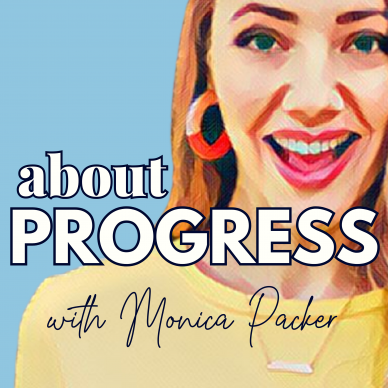
About Progress with Monica Packer
I was still too scared to have goals, but about six months before I turned thirty, I had an idea. I thought about all the things I’d said, “I wish I could do that. That looks fun. That sounds interesting,” but never did them. So what if I were to do them, and do them imperfectly. My coming birthday was a great motivator, so I wrote a list of “30 Before 30” things I wanted to try and experience. They weren’t goals, and it wasn’t about achievement or completion. It was about exploring, to bring back the pieces of myself I had lost along the way. Who am I? What do I still like? What do I want to do more of?
I now call it a Do Something List – DSL. It’s about doing something that scares you, and doing something instead of nothing. I leaned into my passions and interests – cooking, interior design, art, dance … I went to an adult dance class for the first time in thirteen years. Dance was part of my life I had shut off completely when I didn’t make it into anything at BYU. I went on five new hikes. I went to San Francisco to window shop and go to a museum. I began to pick up the seeds of, “This is who you are and these are the seeds you can nourish. These are the parts of yourself that you absolutely need to bring to life, not just for yourself, but for those kids that you want to show up better for.”
I’ve done a Do Something List for seven years and never completed a full list. I always alter them too. This was the first thing that showed me a way to develop myself outside the perfectionism model. It has become a grand experiment to see how I can grow outside of perfectionism. Is this possible? The answer has been YES. I’ve also gotten really into the science that this is the way to grow – it’s exponentially more than when you are in the all-or-nothing mode. I started a podcast and I coach women. My entire life has changed, but mostly internally. Very few things have changed circumstantially, but I show up to my life very differently. It completely changed my life.
I began to speak up in other ways, too. I began to share more of my actual feelings with my husband. I was accepted by my stake even with my questions and was asked to speak or teach anyway. At that point, I didn’t even know if God was real, but people gave me a path forward with compassion and nuance. They made me feel that as messy as I was, I was enough.
Where did you get the idea for the DSL?
It didn’t come from anybody. I’d heard about “bucket lists” of things you want to do and experience, but this feels like a God-given idea. My DSLs provided me short periods of time and exploration for myself, they weren’t about checking things off. That was so new for me! I was having fun and learned to prioritize myself again.
One result was that my confidence grew. I didn’t have to be “good” at things to enjoy them, and I began to apply that concept to other things in my life. I leaned into the “mediocre;” I learned it was okay to make mistakes as you worked on making progress. So, I ventured into personal development in a way I hadn’t in the past. I became a day planner, I started to do goals, I got into habit formation. I started to learn and develop outside of perfectionism. The biggest thing I learned is that growth in any area of your life takes time and is made of small steps. It’s messy and failure is allowed to be part of the process.
With personal exploration and development, I was also healing spiritually. I recognized that God works through me developing myself and the divine in me. I’ve found a path to God by accepting my thinking, questioning mind, and by better accepting myself. When I was growing up, I thought that to be close to God, you have to be totally self-sacrificing, don’t think about your needs, your wants, anything; you find God and then you find yourself.
The opposite has been true for me. I found myself first, and that’s how I found God. The more I have come to know who I am, developing who I am, the more I feel connected to God, the more I feel that I’ve been able to be an instrument for Him to others. Being myself gives me a life of purpose with my gifts, and helps me feel more connected to my Heavenly Parents.
What is your current relationship with the Church and your faith?
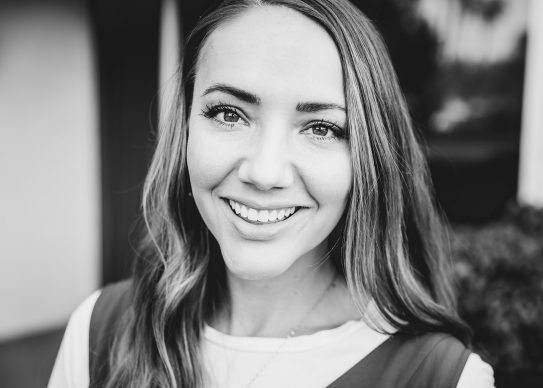
Monica Packer
For me, it’s playing the longest game and making the biggest bet of my life. Making room for the human in myself has freed me up to make room for the human in the Church. I believe that the “true church” will be fully realized when Jesus is here, when He is at the head and humans aren’t in charge of anything. The truth to me is that God lets humans make mistakes, and that has freed me to stay in this particular faith. This is the church I want to be in. When I think big picture, there are so many pieces of the puzzle that we have that I don’t see reflected in other Christian faiths. There are pieces we could definitely work on – it would be remarkable to live up to our own doctrine of Heavenly Parents and have that reflected in how we structure the church, giving women more of a visible part.
Sometimes, I stay because this is my community and my home. Other days, I stay because of the doctrine of Heavenly Mother, although I don’t know exactly what that looks like. I’m open to being surprised about everything. I’ve been teaching Gospel Doctrine the last few years, and I’ve loved seeing the frailties of humans and the flaws in everyone from Judas to Peter and Doubting Thomas, from Mary to Martha. Everyone is flawed and that gives me so much hope. It gives me encouragement to stay even when I get frustrated by the flaws in our faith.
I had an experience in my Walnut Creek ward that validated it was even possible for me to stay as a nuanced member. I went to a temple recommend interview with a new counselor who I didn’t know well, and I told him, “I’m going to be really honest with you. I can’t answer a straight Yes or No to these questions. But I can tell you I want to believe. I want to have a testimony of that.” He sat there for a second, and then read the scripture in Alma 32 that said the seed of faith is enough. He said, “If that’s enough for God, that’s enough for me and these questions.” I got my recommend and came home feeling for the first time in a long time that it’s okay, that I’m okay.
It’s okay that I don’t have answers. It’s okay that I am frustrated, and I have doubts. It’s okay that I get angry and mad and sad. I’m allowed to be here. I am just as valid as any member who has no hesitation to say direct “yes and no” to the temple recommend questions.
I give myself permission to not know, to be frustrated, to have doubts. And I give myself permission to stick with it. Feeling doubt doesn’t mean I have to leave the Church. Staying doesn’t mean I can’t think and wonder and ask questions. I can do both. I feel like God’s biggest test for me is just: “Will you choose faith? Will you choose to try to believe?” That’s it. So I hold onto that.
At A Glance
Name: Monica Packer
Age: 37
Location: Salt Lake City, Utah
Marital History: Married
Children: 5
Occupation: Podcaster and Coach
Convert to the Church: n/a
Schools Attended: Bachelors in English from BYU
Languages Spoken At Home: English
Favorite Hymn: Come Thou Fount (fingers crossed they'll bring it back into the new hymnal!)
Website or Social Media You Would Like Featured:: http://www.aboutprogress.com
Instagram: @aboutprogress
Interview Produced by Trina Caudle
